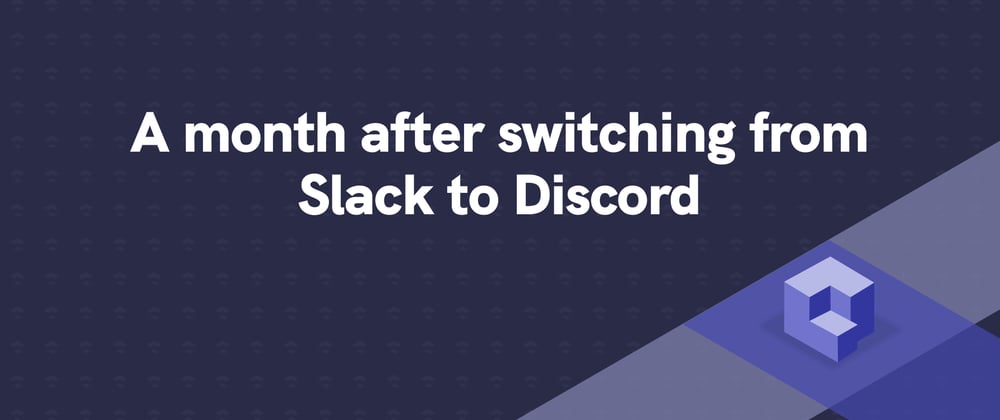Nowadays, Slack is often the default choice for an online communication tool in the tech industry. Startups, enterprises, open-source projects - they all use Slack to communicate within their organization but sometimes also with their users and community. Our startup was no different. In this article, I explain what made us look for Slack alternative and what are our impressions after a month of switching to Discord, so you can learn from those before you make your decision.
The background
Qovery is a remote-first startup founded at the end of the last year. I was hired as the first full-time employee. We are all distributed and work remotely. All our communication happens online. Meetings, plannings, brainstorming sessions, talks with founders, technical discussions, and all the rest - it all happens online without exception.
Our product is focused on solving the developers' problems. We help them in deploying their applications on the cloud. We work with all types of programmers - passionate hobbyists, innovative startup guys, serious enterprise architects but also programming newbies. This is why we work with many different kinds of applications and need to be there to answer various community questions.
This all makes it crucial for us to have a tool that allows communicating flawlessly with our community but also internally within our startup, as all our communication happens online.
What made us switch
Slack is not a bad tool. In fact, there's a reason why it's so popular. But, like all tools, it's not perfect.
What we didn't like was primarily the message history limit. On Slack, you have to pay per user. If you want to preserve the chat history for a growing number of community users, this can get pretty expensive quickly. In this regard, it doesn't really support our needs. Don't get me wrong - we are willing to pay for the tools we use, but Slack pricing model is not well suited for a community communication tool.
We talk (voice) a lot. We think it's important to communicate effectively using our tools, especially when that's the only channel of our verbal communication. Slack was not doing its job well in this regard. Sound, connection issues, and noticeable delay of sound despite decent internet connection made the experience at least not perfect. It's not only Slack issue - we tried many other tools, too, and they all often face similar problems.
Solution?
Discord? It's a tool for online gamers, isn't it? Maybe, but... "On paper" it looked like it could fix all the problems we had with Slack. No history limit, focus on great voice communication... We decided to ignore the "it's a tool for gamers only' stereotype and took a bold move to give it a try in our organization. What's the result?
What was expected to be better is in fact better
In practice, all promises Discord gave us, in real day-to-day usage, turned out to be true:
- Pricing model - we no longer have to pay per user to keep our chat history. You could use it, in fact, for free. We pay less than 80$ per month now for even better audio quality and HD video calls. The price won't change with our growing number of community users.
- Voice / Video chats. This is where Discord shines. The audio quality is excellent, screen sharing works flawlessly, the latency between you speaking and your listeners hearing it is much lower than on Slack and other solutions. Also, what I really like is you do not have to call somebody directly or prepare a group calls - you can just enter a voice channel (Teamspeak and Ventrilo nostalgic memories...).
What was expected to be worse, is in fact worse
- Integrations - we were aware that as a mainly gamers' tool, Discord lacks some of the integrations we used on Slack. Slack has a huge advantage in this space. However, thanks to webhooks combined with Zapier, we were able to configure all integrations we had before also Discord.
- Threaded messages - we were aware of the fact it's missing in Discord, and in fact, it's painful. I do miss it. I wish it was there.
What surprised positively
What surprised me from the first second I launched Discord app was the smoothness and responsiveness of the app. It runs truly, noticeably, SMOOTHER and FASTER than Slack. Using Slack in comparison to Discord feels like being in a slow mode for me now. I completely didn't expect this (in fact I was not aware that Slack was so clunky). It's simply a pleasure to use Discord.
Another thing that surprised me is that Discord seems to grow really fast. In just a month of our usage, the added noise suppression, which eliminates random noises from your background and an option to turn on the webcam during talks on group channels.
What surprised negatively
What surprised me negatively the most is a very inconvenient upload of very long texts (e.g. application logs). If your copy-paste a very long text, it won't be displayed in the chat in any way - it appears as a text file to download instead.
Another thing - file upload size limits are a bit restrictive. There are no limits for the workspace like on Slack, but for a single file upload, the limits are pretty harsh (8MB / 50MB/ 100MB depending on your plan). This means you'll have to share your files elsewhere.
My final thoughts after one month of switching to Discord
I'm selfish. I wish Discord would switch focus from gamers to professionals. It would be then the perfect tool for any IT organization. But for now, these are just my dreams - the reality is that Discord is much better for voice conversations. The app works much smoother and feels more responsive & modern. Chat is worse due to the lack of threaded messages.
In my opinion, you should use Discord if:
- you value quality voice conversations
- you communicate a lot with your users/community
- you don't mind using gamers focused tool (the UI is less suited for enterprise usage than Slack)
I think Discord may gradually turn into a more business-oriented tool. They add features that are useful for IT teams. There's yet a bit to be done, but I hope it will naturally go in this direction. There are a lot of open-source communities using Discord to build their communities at the moment (including Rust, Django, Hasura, Typescript, and many others) and I believe Discord's popularity will grow in our industry.
And, it the end, they use Rust so no wonder why Discord works so smooth! :)
P.S. If you want to try Discord or ask me or our team any question, feel free to join our Discord server.







Latest comments (5)
Discord uses WebRTC which is peer to peer I think so you can avoid the server relaying and save money which is nice. They also have a huge amount of bots you can add and you can make
And they use Rust behind the scene :)
Interesting, I didn't know about the usage of WebRTC. Thanks for pointing it out.
I really like that Discord has built-in voice channels, which is something I figured Slack would have implemented by now. It's just like a virtual conference room that you can easily enter and have impromptu meetings with other team members without having to leave the app, schedule a meeting, send out a link, etc.
Built-in voice channels is definitely one of my favorite features. Very useful and convenient.